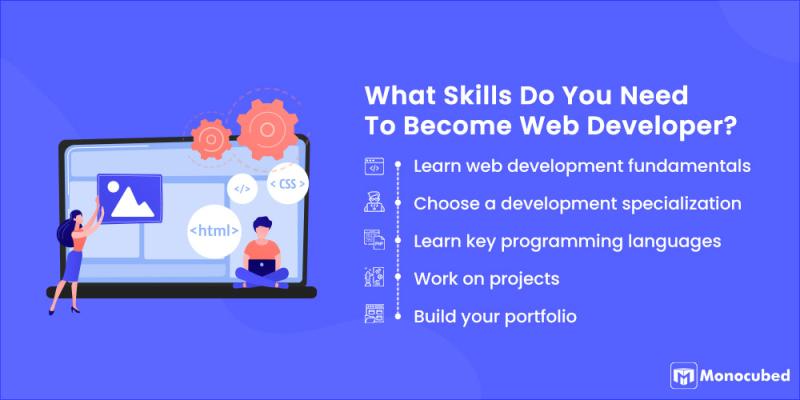What degree you need to become a web developer?
While a formal degree is not always required to become a web developer, many individuals pursue educational paths to gain the necessary skills and knowledge for this field. The educational requirements for web developers can vary, and some professionals may be self-taught or have non-traditional backgrounds. Here are several educational paths that individuals commonly take to become web developers:
Bachelor's Degree in Computer Science or a Related Field:
- Many web developers hold a bachelor's degree in computer science, information technology, or a related field. These programs typically cover fundamental computer science concepts, programming languages, algorithms, and data structures.
Bachelor's Degree in Web Development or Design:
- Some universities offer specialized bachelor's degree programs in web development or web design. These programs often focus on the specific skills needed for creating and maintaining websites.
Associate Degree or Certificate Programs:
- Community colleges and vocational schools offer associate degree programs and certificate programs in web development. These programs are shorter in duration compared to bachelor's degrees and may provide more focused training on practical skills.
Bootcamps:
- Coding bootcamps are intensive, short-term training programs that teach coding and web development skills. Bootcamps are designed to quickly prepare individuals for entry-level positions in the industry. They are often a popular choice for career changers or those looking to upskill rapidly.
Self-Taught Learning:
- Many successful web developers are self-taught. With the abundance of online resources, tutorials, and documentation available, individuals can learn web development on their own. This path requires discipline, motivation, and a strong commitment to continuous learning.
Online Courses and Platforms:
- Various online platforms offer courses in web development, such as Codecademy, Udemy, Coursera, and freeCodeCamp. These courses cover a range of topics, from basic HTML and CSS to more advanced topics like JavaScript frameworks and backend development.
Building a Portfolio:
- Regardless of the educational path chosen, building a strong portfolio of projects is crucial for showcasing practical skills to potential employers. This can include personal projects, contributions to open-source projects, or work completed during educational programs.
It's important to note that, in the tech industry, practical skills and experience often weigh heavily in hiring decisions. Therefore, aspiring web developers should not only focus on formal education but also engage in hands-on projects and real-world applications of their skills.
Ultimately, the best educational path depends on individual preferences, learning style, and career goals. Some web developers thrive with a traditional computer science degree, while others find success through bootcamps or self-directed learning. Continuous learning is a key aspect of a career in web development, as the field is dynamic and technology evolves rapidly.
Degrees that can aid in pursuing a career as a web developer
There are several degrees that can be helpful in pursuing a career as a web developer, each with its own strengths and flexibility. Here are some options to consider:
Traditional Degrees:
- Bachelor of Science in Computer Science (B.Sc. CS): This is the most common and versatile option, providing a strong foundation in programming languages, algorithms, data structures, software engineering principles, and theoretical computer science. While not directly focused on web development, it equips you with the essential skills to learn web technologies quickly.
- Bachelor of Science in Information Technology (B.Sc. IT): Similar to computer science, but with a stronger emphasis on practical application in business settings. You'll learn about networking, systems administration, database management, and web development alongside core IT concepts.
- Bachelor of Fine Arts in Web Design or Graphic Design: This option focuses on the visual and user-experience aspects of web development. You'll hone your design skills, learn about user interface (UI) and user experience (UX) principles, and gain understanding of front-end development tools.
Specialized Degrees:
- Bachelor of Science in Web Development: A more targeted degree program focusing on the specific skills and technologies needed for web development. You'll delve deeper into front-end languages like HTML, CSS, Javascript, back-end languages like Python or Java, web frameworks, and content management systems.
- Bachelor of Arts in Interactive Media or Digital Media: Combines web development with other digital media skills like animation, video production, and digital marketing. This can be particularly valuable for careers in interactive design, web applications, or creative agencies.
Alternatives to degrees:
- Bootcamps: Intensive programs with a condensed curriculum focused on practical web development skills. They can be a faster and more affordable option for career changers or those already familiar with basic coding concepts.
- Online courses and self-learning: With abundant online resources and tutorials, it's possible to learn web development independently. This requires strong self-discipline and dedication, but can be a cost-effective way to enter the field.
Choosing the right degree for you:
The best degree depends on your individual goals, learning style, and financial situation. Consider these factors:
- Your interests: Do you enjoy the theoretical aspects of computer science or prefer the practical hands-on work of web development?
- Your career aspirations: What specific path do you want to take as a web developer (front-end, back-end, full-stack)?
- Learning style: Do you prefer classroom learning or independent study?
- Cost and time commitment: Traditional degrees take longer and are more expensive than bootcamps or online courses.
Remember, your degree is just one piece of the puzzle. Building a strong portfolio of personal projects, gaining practical experience through internships or freelance work, and staying up-to-date with the latest technologies are equally important for success in the web development field.
I hope this information helps you choose the right path for your web development career! Feel free to ask if you have any further questions about specific degrees or programs.











